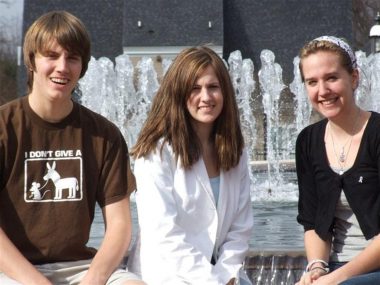As three Elon students learned over the fall, sell enough pins in the shape of a white ribbon with red dots, and you might just save hundreds of lives overseas from a disease that has all but been eradicated in the United States.

More than $850 has been raised through sales and donations. The Elon freshmen contacted the American Red Cross, a co-sponsor of the Measles Initiative, which provided the lapel buttons on the promise they go on sale for a dollar. The Measles Initiative is a joint partnership that, according to its web site, is “committed to reducing measles deaths worldwide.”
“We’ve mostly been selling (the pins) to people we know or people we thought would provide donations,” Heiss said in a recent joint interview, where Clark added, “It worked selling them to friends and family back home.”
According to the Measles Initiative, an estimated 243,000 people worldwide died from the disease in 2006, with young children making up the bulk of the victims. Southeast Asia saw the most number of deaths (178,000), followed by Africa (36,000) and the Eastern Mediterranean (23,000).
“It’s a disease that really only affects the poor,” Gay said. “It’s such a cheap vaccine that anyone even in a Second World nation can get it.”
Heiss was first introduced to the Measles Initiative as a sophomore in high school. Clark, who wants to go into medicine, was eager to join Heiss in helping the program because of her career interests. Gay, too, saw the possibilities of raising money for the cause and partnered with the women to study the issue.
“Amanda, Sydney and Chris’s project was successful not only in the amount of money raised, but in their group’s level of organization and enthusiasm for the project. They immediately took initiative to contact experts in the field,” said Cynthia Fair, a professor of human services and chair of the department. “Their passion for the topic and their ultimate project really came through.”
The research was highlighted by Clark’s interview with the head of the World Health Organization in Guinea-Bissau in western Africa, where nearly one out of every four people who contract the disease die. The team also interviewed a specialist with the Centers for Disease Control and Prevention.
Their conclusion in a paper for the course: “We feel it is necessary for worldwide citizens, specifically citizens of developed countries, to recognize the measles pandemic as an area in need of direct attention.”
Perhaps they already do.
“I thought we were going to make about $200,” said Heiss, a psychology major from Edison, N.J. “People seemed to want to donate. That was great.”
To buy a pin, contact Sydney Heiss at sheiss@elon.edu.


